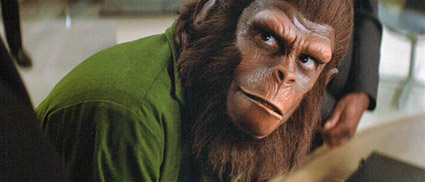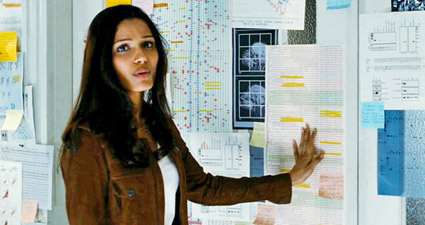 After watching Tim Burton's remake of "Planet of the Apes" (2001), I concluded there was no need for another "Ape" movie to ever be made. Thirty-three years of progress in makeup technology didn't help the latter version become any better than the one that inspired it. That's why, hearing there would be a "Rise of the Planet of the Apes" a decade later, I had no expectations and feared the worst, but the results were pleasantly surprising. We often associate the word "remake" with a lack of creativity so when an exception turns out, it's important to look back and try to understand the reasons behind this.
After watching Tim Burton's remake of "Planet of the Apes" (2001), I concluded there was no need for another "Ape" movie to ever be made. Thirty-three years of progress in makeup technology didn't help the latter version become any better than the one that inspired it. That's why, hearing there would be a "Rise of the Planet of the Apes" a decade later, I had no expectations and feared the worst, but the results were pleasantly surprising. We often associate the word "remake" with a lack of creativity so when an exception turns out, it's important to look back and try to understand the reasons behind this.
"Rise of the Planet of the Apes" is the first movie in a new "Planet of the Apes" series and it is also a direct remake of "Conquest of the Planet of the Apes" (1972), the fourth entry in the original pentalogy. The lead in both cases was a chimpanzee named Caesar who led his peers in revolting against the oppressive humans of the time, establishing his kind as the superior species and relegating mankind to a secondary role.

The Caesar of "Conquest" (played by a masked Roddy MacDowall) was the son of Cornelious and Zira, the chimpanzee scientists who traveled from earth's future in Charlton Heston's old spaceship. This was an intriguing cinematic premise but also absurd since these creatures had no aeronautical knowledge whatsoever (remember their surprise upon first seeing a paper plane?); they had no means to pull the craft from the bottom of a lake and more importantly, considering that the vessel was meant to ride at supersonic speeds to make it zoom through time (as per Einstein's theories), how could it possibly travel to the past? By putting it in reverse? These details were conveniently ignored which is just as well since no time travel feature ever make sense anyway.
In "Rise of the Planet of the Apes" the new Caesar is adopted as an infant by genius scientist Will Rodman (James Franco) just as he's about to be put down. He grows in a loving home and develops an intelligence well above that of humans of his age, thanks to a drug his mother received during pregnancy. After a nasty attack on a disagreeable neighbor, Caesar is sent to an ape shelter and the movie becomes the typical prison flick with the hero plotting with his newly-found friends against the sadistic warden and escaping to the woods near San Francisco, where they'll remain while mankind is attacked by the same miracle medication that made apes smart.

"Conquest" wasn't precisely one of the best movies of the original "Ape" series. It came out at a time when 20th. Century Fox was in deep financial trouble due to flops like "Hello Dolly" and the original "Dr. Doolittle." The filmmakers had to make little appear like much by shooting several identical scenes with the same group of apes pretending to number thousands. The rebels effectively secured about two square blocks of a futuristic Los Angeles , which was supposed to convey their successful takeover of the whole planet. How humans eventually lost their wits and voices was never mentioned but more disconcerting was the only possible explanation for apes acquiring the power of speech (no drugs where involved here). Did Caesar's descendants inherit these abilities through his breeding? If so, that would mean (a) He went on to mate with all three kinds of apes (chimpanzees, gorillas and orangutans) and (b) Cornelius and Zira descended from their own son.
"Rise of the Planet of the Apes" made things simpler by keeping time travel out of the equation but it took a few liberties of its own. Its Caesar's intelligence derived from one of those cinematic "what could possibly go wrong here?" miracle drugs (see "Deep Blue Sea" and "28 days later"), the kind of substance intended for the benefit of mankind that instead brings all sorts of unexpected calamities. What's puzzling here is that only a few dozen apes are actually seen receiving it, which means most of those recruited by Caesar at the zoo could only have acquired it through osmosis.
In contrast to its predecessor, "Rise" has several breathtaking sequences. I specially liked its portrayal of the passage of time by showing our hero climbing giant redwood trees, with the back drop of the changing seasons. This is an example of great looking See Hugh Grant walking through various weathers in the streets of "Notting Hill" and Russell Crowe developing his math theories in the windows at Princeton for "A Beautiful Mind" as the ivy grows). My only complaint about director Wyatt's techniques is how he shoots some spectacular action scenes, going way beyond what creatures of such size and weight could ever accomplish--and consequently reminding us that we are only watching an illusion, no matter how well done. Think for example of the moment that shows a giant gorilla taking a giant leap into a helicopter or the one with the giant orangutans crossing the Golden Gate Bridge by hanging from thrust to thrust.
The humans in "Rise" don't fare quite as well as their ape counterparts. John Lithgow is excellent as usual in the brief role as Will's father but James Franco's character is two dimensional. He plays a genius scientists who can conjuncture miracle drugs at will, even though he doesn't seem to show up at work very often. (When his ALZ-112 hits a snag, he comes up with the ALZ-113 the very next day). The script is too careful to deflect any kind of conflict between him and Caesar and downplays the fact that Will is the sole creator of the drug that wipes out mankind. Saying "you don't know what you're dealing with here!" is supposed to exonerate him from any blame.

We also have Will's clueless boss Steven Jacobs (David Oyelowo) in the typical evil capitalist role, who's so concerned with profits, he doesn't seem to have an idea on the unprecedented scientific miracles going on in his lab. There's also the beautiful veterinarian (Freida Pinto) whose only function is to sound wise while delivering cautionary statements, even though it takes her years to realize there is something out of the ordinary about Ceasar's intelligence. More damaging is how wasted Brian Cox's character is, and the overuse of his teenage brat son. The latter is just not a very good screen match for Caesar, especially in the key sequence when he utters the immortal line, "get your paws off me you damn dirty ape!" This moment had the potential to be just as memorable as when the words were first delivered by Charlton Heston, but I think it needed a more imposing actor like Cox, who goes into oblivion without making much noise.



Regardless of these shortcomings, the humans in "Rise of the Planet of the Apes" are merely a tool to help convey Caesar's story and it is when dealing with him that the film is at its best; the rest is formulaic. This is a fully, three-dimensional character whose presence seems impervious to thorough scrutiny, no matter how far or close the camera gets. Most of today's CGI delivers images that seem taken from an alternate reality but there are exceptions.
The best proof of the filmmakers' confidence on their technology is the fact that, just like in the latest version of "King Kong," they start the movie with some shots of the real thing to which their creations will be compared. "Rise" is probably Andy Serkis' best computer-captured work and even though he also played King Kong, both ape performances couldn't be more different. In the first case he portrayed an animal that progressively develops feelings, and in the second he's an unpredictable creature of complex motives. The sight of a beast whose eyes convey intelligence is something I'd never quite seen before. All the apes in "Rise" are miles ahead of their counterparts in "Conquest" (the latter were merely masked humans whose body sizes and complexions were all the same) but it's fair to say that believability was never an issue with the older "Ape" movies either.

"Rise of the Planet of the Apes" is a surprisingly good picture with ground breaking effects that alone justify another crack at a story that seemed milked to death not long ago. If you're going to remake any movie, it's better to choose one that never became all that it could have the first time around. It also helps if the results are radically different. The possibilities for new "Ape" films now seem endless and here are a few closing suggestions:
It's perfectly acceptable to redo the original "Planet of the Apes" as it's been more ten years since the last try and Burton's release provided nothing interesting or memorable that a new version couldn't compete with. There's a short scene in "Rise" that shows some characters watching a TV news segment about a spaceship successfully arriving in Mars after an eight month trip, so it's a fair bet the next entry will be based on the arrival of those astronauts to the new, upside-down earth. I hope the new movie will focus more on the mysteries behind their discovery of what went on during their absence, rather than only on action ("Rise" gave us more than enough of that). I also hope the virus that destroyed humanity left the survivors mute and dumb. As past experience proves, a single, superior species is vital for these movies to work.
Gerardo Valero is lives in Mexico City with his wife Monica. Since 2011 he's been writing a daily blog about film clichés and flubs (in Spanish) on Mexico's Cine-Premiere Magazine. His contributions to "Ebert's Little Movie Glossary" were included in the last twelve editions of "Roger Ebert's Movie Yearbook."





